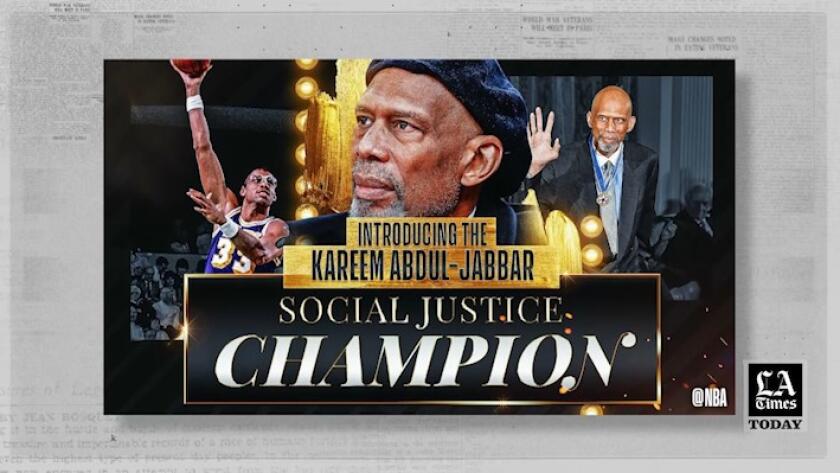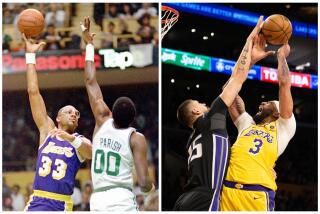Kareem Abdul-Jabbar on Juneteenth, social justice work and more
- Share via
In an extended interview, the former NBA star discusses the league social justice award after him, his efforts to fight inequality and Juneteenth.
- Share via
Kareem Abdul-Jabbar appeared on “Los Angeles Times Today” this week to discuss the continued role that activism plays in American society. The six-time NBA champion boycotted the 1968 Olympics, stood beside Muhammad Ali as he protested the Vietnam War and is now being honored by the league with the Kareem Abdul-Jabbar Social Justice Champion award given to the current player who exhibits the Lakers legend’s same heart for equality. He is also releasing the documentary “Fight the Power: The Movements That Changed America” on Saturday, Juneteenth, and throws in some thoughts on the Lakers’ injury-plagued season.
Here are a few highlights from his interview:
On his Juneteenth documentary ‘Fight the Power’
“A protest is really part of every American’s DNA, no matter where you come from, no matter what your issues are, Americans have gone out and protested and have made America a better place because of it. So I’m going to try to give every angle I can to it and show how it’s really all coming from one single need for people who get treated badly. They need to be able to let people know about it and change that situation. So I hope you’ll tune in, and I hope you enjoy it.”
On being an athlete-activist
“When Dr. King was assassinated, I was involved in a demonstration on UCLA’s campus, and I had people come up to me, this is 1968, and tell me, ‘Hey you’re going to have a job in the NBA probably, so don’t complain.’ And it’s the same sentiment when LeBron is told to shut up and dribble, he’s being told that despite the fact that he is a citizen of this country, he doesn’t have the right to talk about things that trouble him. That doesn’t work. And it’s not going to work. And that’s why shut up and dribble has not really taken in this country.”
How to continue social justice work
“There has to be some type of communication. There should be some type of bridges. Or if you talk to Dr. Harry Edwards up in the Bay Area, he can explain it to you. And a lot of the fallout from Colin Kaepernick’s demonstrations has led to progress. Different teams have players on their roster that have reached out and have made significant connections with law enforcement and the communities that they play in. So it wasn’t all wasted time. A lot of these things happen out of the spotlight, but things do happen.”
On Lakers injuries plaguing their season
“There’s nothing you can do about guys getting hurt, you know. 1989 we got swept, Magic and Byron Scott didn’t play a game in the final. 1983, we got swept by Philadelphia. Bob McAdoo, Norm Nixon, James Worthy didn’t play in the final. So you know that crystal ball can have some real bad news for you, and you have to accept that.”
More to Read
All things Lakers, all the time.
Get all the Lakers news you need in Dan Woike's weekly newsletter.
You may occasionally receive promotional content from the Los Angeles Times.







